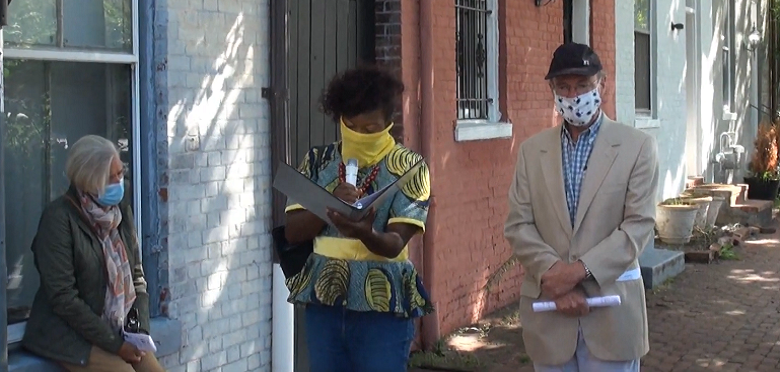WATCH RECORDING: “Presbyterians and Race” Walk

On Saturday, September 19, 2020, the Reformed Institute held a reflective walk in Old Town Alexandria, Virginia, to sites that mark key moments in the story of Presbyterians, White supremacy, and Black resistance from Colonial days to the present. The walk focused on challenge, reflection and inspiration to action at each of the sites (see below). This event can be done again for Reformed Institute Congregations at no cost and to others with shared expenses.
Presbyterian cemetery (starting point) where White slaveholders and workers for abolition are buried side by side. We will also pass the Frederick Douglas Cemetery, where many Black families are buried.
The Freedom House: now a Museum built on one of the largest holding pens for enslaved peoples, often “owned” by White Presbyterians like Carlyle and Alexander, but with their own stories of resistance and dignity.
Site of Appomattox Statue to dead Confederate soldiers, including white Presbyterians, who fought for the “the Lost Cause,” and recently removed by the city after Virginia law changed.
Beulah Baptist Church: founded by Rev. Clem Robinson, a graduate of Presbyterian Ashmun Institute (PA) for African-Americans, and site of first theological school founded for former slaves during Reconstruction.
Alexandria Academy: first semi-public school for Whites in Alexandria, organized and lead by Presbyterians, and supported by George Washington’s scholarships for poorer students. Robert E. Lee was schooled here. Also site of early Black school in 19th century.
The Departmental Progressive Club: established by Black federal workers, denied access to established clubs, in order to strengthen social networks and offer hospitality to professional Black families.
Old Presbyterian Meeting House: Colonial church founded by city fathers, with prominent slave “owners,” some slavery resisters, and some Black congregants in the early days.
Contraband and Freedman’s Cemetery: burial site of Black Freedmen who struggled with White supremacy and those who successfully escaped slavery during Reconstruction. Their stories continue to inspire and guide present struggles for racial justice. (Vans will take us here, and back to cars at the Presbyterian Cemetery.)
